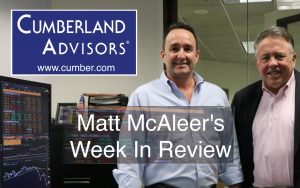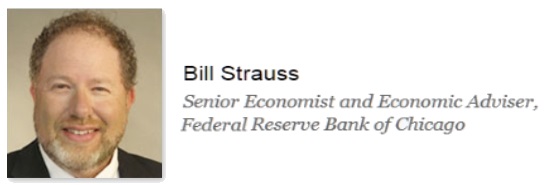 The Cumberland Advisors Week in Review is a recap of news, commentary, and opinion from our team. These are not revised assessments, and circumstances may have changed in the market from the time of original publication. We also include older commentaries that our editors have determined may be of interest to our audience. Your feedback is always welcome.
The Cumberland Advisors Week in Review is a recap of news, commentary, and opinion from our team. These are not revised assessments, and circumstances may have changed in the market from the time of original publication. We also include older commentaries that our editors have determined may be of interest to our audience. Your feedback is always welcome.
MATT MCALEER'S WEEKLY RECAP
Bond Yields - What do we do during volatility? When does the bond market see its biggest influx of cash? John Mousseau describes "Feeding the Beast" and how that benefits our strategy.
Matt McAleer talks about the tricky aspects of trading, the rallies and dips, and looking for the higher low in weak markets. WATCH HERE.
Look forward to extended quarterly videos for our clients that will incorporate equities and fixed-income.
MARKET COMMENTARY
-
4Q18 Review: Tactical Trend
Matthew McAleer 01/04/2019
-
Q2018 Review: Puerto Rico Insured Bond
Shaun Burgess 01/03/2019
-
Total Return Taxable Fixed Income: 4Q 2018 Review
Daniel Himelberger 01/02/2019
-
4Q2018 Review: Munis Turn It Around
John R. Mousseau, CFA 12/28/2018
-
Yogi Berra, the Fed’s Balance Sheet, and Liquidity
Robert Eisenbeis, Ph.D. 12/28/2018
-
Stock Market and Tariff Truce
David R. Kotok 12/21/2018
-
More Evidence Supporting a 60/40 Portfolio
Gabriel Hament 12/24/2018
-
Market Backlash
Robert Eisenbeis, Ph.D. 12/21/2018
Sign up or see more Market Commentary
UPCOMING EVENTS
-
-
Adapting to a Changing Climate
From hurricanes to red tide and sea level rise, learn how a changing climate affects the Sarasota-Manatee region and the state of Florida. Expert speakers will discuss the challenges and impact on Florida and other coastal communities while uncovering the adaptive strategies that bring unique social and economic opportunities. The featured speaker is Bob Bunting, CEO Waterstone Strategies/Scientist/Entrepreneur - January 25, 2019 – Selby Auditorium, USFSM , 8:30 am – 3 pm. Lunch is included. Cumberland Advisors is a sponsor and Patricia Healy, CFA, from our firm will discuss "Climate, Municipal Bonds and Infrastructure" with the audience. Details Here.
-
-
U.S. Manufacturing in a Global Context
Save the Date! GIC is returning to Sarasota, FL on Friday, February 1, 2019 to partner with the Financial Planning Associates of the Suncoast and Cumberland Advisors. Join us at the Sarasota Yacht Club as we welcome Bill Strauss, Senior Economist and Economic Adviser of the Federal Reserve Bank of Chicago, for a presentation on U.S. Manufacturing in a Global Context. Strauss is a senior economist and economic adviser in the economic research department at the Federal Reserve Bank of Chicago, which he joined in 1982. His chief responsibilities include analyzing the current performance of both the Midwest economy and the manufacturing sector for use in monetary policy. Details Here.
FEATURED INTERVIEWS
 Investors React to Biggest U.S. Stocks Rally Since 2009 Investors including Cumberland Advisors Chief Investment Officer David Kotok and Port Shelter Investment Management CEO Richard Harris assess yesterday’s rally in U.S. equities, the biggest since 2009.
Investors React to Biggest U.S. Stocks Rally Since 2009 Investors including Cumberland Advisors Chief Investment Officer David Kotok and Port Shelter Investment Management CEO Richard Harris assess yesterday’s rally in U.S. equities, the biggest since 2009.
Watch here: https://www.cumber.com/investors-react-to-biggest-u-s-stocks-rally-since-2009/
Yahoo Finance: David Kotok on Recession, Consumer Spending Power, & Oil/Gas Prices
Yahoo Finance’s Adam Shapiro and Julie Hyman are joined by Jetco CEO Brian Fielkow and Cumberland Advisors Chairman & CIO David Kotok to discuss oil and the future of the trucking industry.
David Kotok of Cumberland Advisors: “Every penny down or up in the price of gasoline is a billion and a half direct disposable income in American consumers’ pockets. We have just had a huge infusion of spending power with a drop in the oil price.”
Watch here: https://news.yahoo.com/trucking-ceo-lot-bring-drivers-174355387.html
IN THE NEWS
-
- CNN Business - How Trump's trade war is unraveling the Trump rally
- Quoted:David R. Kotok 01/03/2019
-
- Fortune Magazine - ‘A Tremendous Opportunity to Buy.’ How Presidents Have Fared as Stock Market Prognosticators
- Quoted:Cumberland Advisors 12/28/2018
-
- Bloomberg Radio - Fair For Mnuchin To Pinpoint Algo-Trading: Eisenbeis (Radio) – Bloomberg Markets
- Quoted:David R. Kotok 12/17/2018
-
- Wallet Hub - What are the Do’s and Don’ts of New Year’s resolution-making?
- Quoted:Gabriel Hament 12/19/2018
IN CASE YOU MISSED IT
-
-
Trump, Policy, Markets
David R. Kotok 01/17/2017As Don Rissmiller of Strategas Research Partners succinctly points out, “There are four types of government policy that can be used to steer the economy: 1) monetary policy, 2) fiscal policy, 3) regulatory policy, and 4) trade policy.” We will use Don’s framework for today’s discussion. Monetary comes first. After eight years of zero-interest-rate policy, the United States’ central bank finally raised its policy interest rate by a quarter point in 2015 and by a second quarter point in 2016. For the last 10 years, the Fed has missed on all of its forecasts of inflation (PCE) and unemployment (U3) and growth (GDP). The originally famous dot plot has become infamous, and one member of the FOMC did not even hazard a forecast as of the last meeting. (See “December FOMC Minutes,” by Bob Eisenbeis: cumber.com/december-fomc-minutes/.) Markets seem to be expecting two Fed hikes in 2017. So our base-case forecast for the end of 2017 is a policy rate range of 1.25% to 1.5%. That would put three-month LIBOR at about 2%. We expect the 10-year US Treasury note to yield around 3% or so. We believe the tax-free bond market sell-off was wildly overdone, and we expect the present 4% level on tax-free high-grade Munis to give way to the 3% handle level. Beyond 2017 is still guesswork, since the details of Trump policies are only guesses. We think this will change quickly, and then markets can refine estimates of Fed policies and rate forecasts. This lack of clarity and base-case assumption about the Fed was well articulated by Phillipa Dunne & Doug Henwood in the Liscio Report. Continued...
-
-
-
Contagion Risk, Big Banks, Junk Funds
David R. Kotok 01/12/2016“When Currencies Collapse” is the title of a Peterson Institute essay by Simeon Djankov (December 30, 2015). Djankov discusses the drivers of recent currency devaluations in Azerbaijan, Georgia, and Russia, along with the fallout that lies ahead. In addition, there are violent currency adjustments visible in Asian currencies including China. Our observations follow, with an eye toward the potential risk of contagion. In order to dampen that risk, we have taken the financial sector to underweight and specifically lowered the large banks. Some bullets follow. 1) We remember 1997, when the very first currency in crisis was the Thai baht. Markets dismissed the baht’s collapse as an aberration. But by 1998 a major hedge fund had failed; the big banks were in retreat; and the Fed was intervening to avert a meltdown. Many currencies and their related debt were in trouble. What began as a seemingly isolated incident morphed into a contagion. The players in the Asian crisis of 1997-8 hadn’t learned from the Mexico crisis of 1994 or the European Monetary System crisis of 1992. 2) The Djankov essay names several currencies in trouble. Since that essay, China has made headlines with its problems and its use of reserves to defend its currency. Many of these currencies have or had managed links to the US dollar. Those links are now broken or are breaking. So debtors owe in dollars and attempt to earn in the local currency. When the link breaks, all hell can break loose. It may be doing so now. Bullets 3-8 at the link. Continued...
-
ADDITIONAL RESOURCES
Lessons from Thucydides

David R. Kotok has written the monograph pamphlet, “Lessons from Thucydides” detailing information asymmetries and their implications for investors and world affairs. The concept of a Thucydides Trap and its rise and avoidability (or lack thereof) is often debated and David makes a case for dealing with them weaving current and historical events into a comprehensive narrative.
This free monograph also has lessons for President Donald Trump’s trade policy. Can the United States avoid a Thucydides Trap with China & Xi Jinping? Will you benefit from the Lessons of Thucydides or fall victim to a Thucydides Trap? If information is key, you now have a handbook at your fingertips. Download a copy of this monograph in either PDF (free) or Kindle ($.99) format. https://www.cumber.com/thucydides/
Have you subscribed to our YouTube Channel?
Thank you for engaging with us, your comments always welcome.





